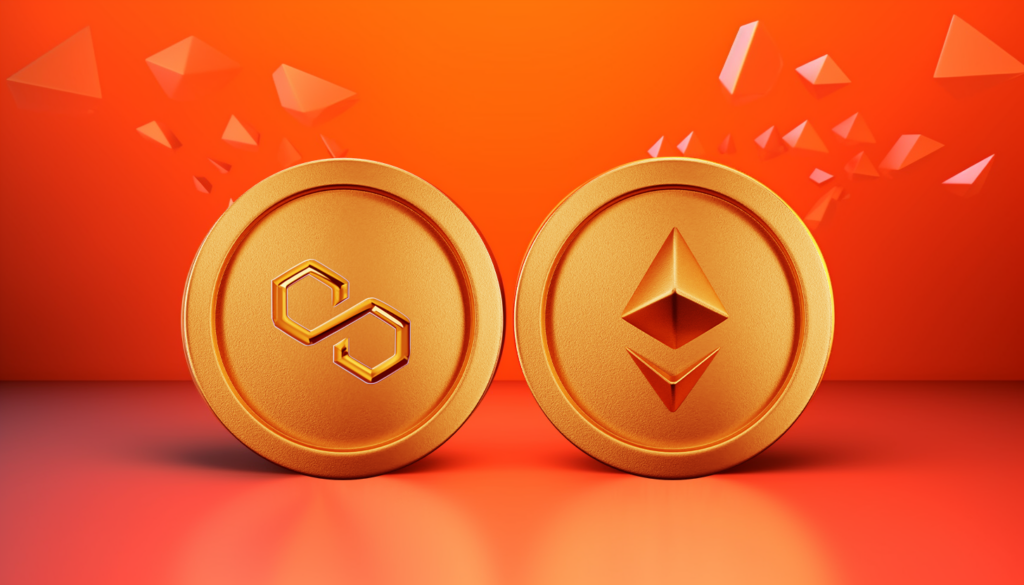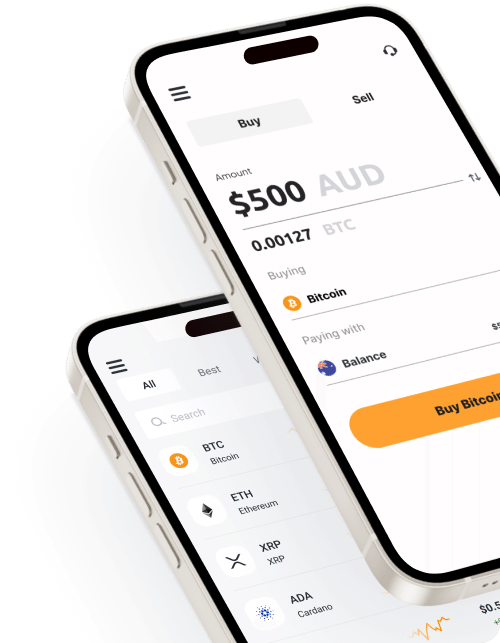
Ethereum and Polygon are like two unique destinations in the digital universe, each with its own appeal much different to Bitcoin. Imagine Ethereum as the grand, established city filled with intricate architecture, while Polygon is the sleek, modern suburb designed for efficiency. Whether you’re looking to explore the world of NFTs, play GameFi, or simply understand the differences between these two platforms, this guide will help you navigate both ecosystems. We’ll highlight what sets them apart in terms of speed, cost, and user experience.
Short Summary
- Polygon’s Advantage: With faster speeds and lower costs, Polygon functions as an efficient expressway for transactions and gaming, providing a sleek and cost-effective alternative to Ethereum’s more established but sometimes congested network.
- Ethereum’s Legacy: Ethereum stands as a pioneering platform, with a vast ecosystem of decentralised applications and smart contracts. It’s the historic capital of the crypto world but faces challenges in scalability and transaction fees compared to the modern efficiencies of Polygon.
- A Dynamic Duo in NFTs and GameFi: Both Ethereum and Polygon host bustling markets for NFTs and GameFi, with Ethereum being the original hub and Polygon offering a nimble, more accessible counterpart. Their unique features and interplay provide a diverse landscape for users to explore, create, trade, and play.
Contents
- Polygon and Ethereum: An Overview
- Key Differences Between Polygon and Ethereum
- NFTs on Polygon vs Ethereum
- GameFi on Polygon vs Ethereum
- Summary
- FAQ
Polygon and Ethereum: An Overview
Ethereum and Polygon have experienced tremendous growth in the last few years. Ethereum has a massive user base as well as various decentralised apps and smart contracts that make up its thriving ecosystem. However, it remains behind in terms of scalability and transaction fees when compared to Polygon, which offers both faster transactions at much lower costs than that of the Ethereum network. Ethereum on the other hand still prevails in total value locked (TVL) along with having a greater market cap.
What is Ethereum?
Ethereum is kind of like the internet’s super computer. Just as your own computer runs apps, Ethereum runs “smart contracts,” which are like computer programs that can’t be messed with or stopped once they get started. These smart contracts are what power all sorts of things from games, to swapping digital money like cryptocurrencies, to even making things called “NFTs” that people can buy and sell as one-of-a-kind digital art. It’s all powered by its own digital money called “Ether,” and anyone can build on it, making it a big playground for cool futuristic tech ideas!
What is Polygon?
Imagine Ethereum is a bustling city with tons of cars (transactions) on the road. Sometimes, it gets jammed and everything moves really slowly. Polygon is like a super-fast highway system built around that city. It helps all those cars move faster and with less hassle, and it does that for way cheaper, too. In tech terms, it’s a “layer 2” solution, meaning it is built on top of Ethereum to speed things up. If you’re playing a game or trading digital assets that are built on Ethereum, using Polygon means everything’s going to be quicker and cost less in fees. It’s like a shortcut to make everything on Ethereum more accessible.
Key Differences Between Polygon and Ethereum
Let’s imagine Ethereum and Polygon as two video game systems. Ethereum is like the original console that everyone loves, but sometimes it gets overloaded and can slow down. Polygon is like a cool add-on that makes the games run smoother and faster. They work together, but they have some key differences that make them unique. Let’s dive into those differences:
Scalability
Think of scalability as how many players can play the game at once without lagging. Ethereum can get bogged down when too many people are playing, kind of like an older game system struggling with a brand-new game. Polygon, on the other hand, is like a powerful upgrade that lets way more people play without any slowdowns. It’s built to handle lots of action without breaking a sweat.
Transaction Fees
Transaction fees are like the tokens you need to play the game. On Ethereum, these tokens can get pretty expensive, especially when lots of people want to play. It’s like having to pay more at the arcade during peak hours. Polygon makes the tokens way cheaper, so more people can join in without spending a fortune. It’s like having unlimited playtime on your favorite arcade game for just a few bucks.
Consensus Mechanisms
The consensus mechanisms are like the rules that govern how the game is played and who gets to make the decisions. Ethereum used to use a method called “Proof of Work,” which was like a challenging tournament where players competed to solve puzzles. It has now shifted to “Proof of Stake” (PoS), which is more like a VIP club where members get to make decisions based on how many tokens (or “stakes”) they own. It’s a more efficient and eco-friendly way to run the game. Polygon, on the other hand, uses its own variations of PoS that are designed to be even quicker, sort of like a streamlined version of the VIP club. Both systems aim to keep things fair and secure, but they do it in slightly different ways, offering unique experiences within the same gaming universe.
NFTs on Polygon vs Ethereum
Let’s dive into NFTs. These unique digital collectibles like virtual trading cards or artwork, are available on both Ethereum and Polygon. Imagine you’re shopping for cool limited-edition sneakers, but in the digital world. Ethereum was like the original store that sold these, but then Polygon came along as a trendy new shop that works alongside Ethereum’s store. They both offer similar products, but there are some neat differences in how you get them.
Creation and Minting
Creating and minting an NFT is like designing and packaging your own limited-edition sneaker. On Ethereum, this can be a bit pricey and slow because it’s like working with a famous designer brand; there’s a cost for quality. But on Polygon, it’s faster and cheaper, like using a new, hip brand that’s super efficient. You still end up with an awesome product, but Polygon makes the process easier on your wallet and your patience.
Buying and Selling
When it comes to buying and selling these digital sneakers (NFTs), Ethereum is like an upscale boutique, known for its quality but also for higher prices and slower checkout lines. Polygon, on the other hand, is like a flash online store with quick checkout and way lower prices. If you’re buying or selling NFTs on Polygon, you’ll find that it’s quicker and costs less in fees. It’s like snagging a deal at a trendy pop-up shop instead of waiting in line at the exclusive boutique.
GameFi on Polygon vs Ethereum
GameFi is where gaming meets finance in the digital world. It’s like playing your favorite video games, but you can earn and trade virtual items that have real value. Both Ethereum and Polygon have become places where these games live, but they offer slightly different gaming experiences. Think of Ethereum as a high-end gaming console, and Polygon as the latest, cutting-edge gaming system that’s designed to work with the older one. Let’s break down how they differ.
Transaction Costs
When you’re playing games that involve buying, selling, or trading virtual stuff, there are costs involved, kind of like paying for in-game purchases. On Ethereum, these costs can be like buying those super-exclusive, limited-edition items that are really cool but can get expensive. Polygon, however, is like finding those same items on sale all the time! The fees for doing things are much lower, so it’s like gaming on a budget without losing any of the fun.
Performance
Performance is about how smoothly the games run. Playing GameFi on Ethereum can sometimes feel like playing a new game on an older console; it works, but there might be some delays or lag at busy times. Polygon is like a system upgrade designed specifically for these types of games, so everything runs faster and smoother. It’s like the difference between playing on an older computer and a brand-new gaming PC that’s built for speed.
User Experience
Now, let’s talk about what it’s like to actually play these games on both platforms. Ethereum offers a rich and established gaming experience, like playing on a console that’s been around for years with tons of games. But the higher costs and occasional slowdowns might be a buzzkill at times. Polygon, on the other hand, aims to give players a more streamlined and affordable experience. It’s like using the latest gaming platform with all the newest features, making it easier to jump in and start playing without worrying about delays or high costs.
Summary
So, to wrap it all up, both Ethereum and Polygon are like two different gaming systems in the crypto space. Ethereum is the classic console that’s home to tons of players and cool games, but sometimes it can get a bit crowded and pricey. Polygon, on the other hand, is like a snazzy upgrade that is built on top of the old system, making everything run faster, smoother, and cheaper. Whether it’s about buying and creating one-of-a-kind digital collectibles called NFTs, or playing GameFi where video games meet real-world value, each platform offers its own unique vibe and features. In the end, it’s about choosing what suits your needs in this ever-evolving digital playground!
Frequently Asked Questions
What is Ethereum?
Ethereum is like a supercomputer for the internet that runs “smart contracts,” allowing people to create games, digital currencies, and even unique digital art called NFTs. It’s powered by its own digital money called “Ether,” and it’s known for being a big playground for all sorts of futuristic tech ideas.
What is Polygon?
Polygon is like a fast highway system built around Ethereum’s city, helping everything move quicker and cheaper. It’s known as a “layer 2” solution and acts like a shortcut to make everything on Ethereum more accessible and efficient.
What’s the difference in transaction fees between Ethereum and Polygon?
Ethereum’s transaction fees can be pretty high, like paying premium prices at an arcade during busy hours. Polygon, on the other hand, offers much lower fees, making it like having unlimited playtime on your favorite game for just a few bucks.
How do NFTs work on Polygon vs Ethereum?
Both Ethereum and Polygon allow you to create, buy, and sell NFTs, which are unique digital collectibles. Creating and trading NFTs on Ethereum can be slower and more costly, while Polygon offers a faster and more affordable experience, like shopping at a trendy pop-up shop instead of an exclusive boutique.
What’s GameFi, and how does it differ on Polygon and Ethereum?
GameFi is where gaming meets finance, letting you play games and earn real value. Ethereum offers a rich, established gaming experience but might have higher costs and slowdowns. Polygon gives a sleeker, more budget-friendly experience, akin to playing on a brand-new gaming system that’s built for speed.
What’s the difference in consensus mechanisms between Ethereum and Polygon?
Ethereum has shifted to “Proof of Stake” (PoS), like a VIP club where decisions are made based on how many tokens you own. Polygon uses its own variations of PoS, designed to be even quicker, sort of like a streamlined version of the VIP club. Both aim to keep things fair and secure but offer unique experiences.
How does scalability compare between Ethereum and Polygon?
Scalability is how many players can play without lagging. Ethereum can slow down with too many users, like an older game system with a new game. Polygon is like a powerful upgrade that lets many more people play without any slowdowns, built to handle a lot of action effortlessly.



